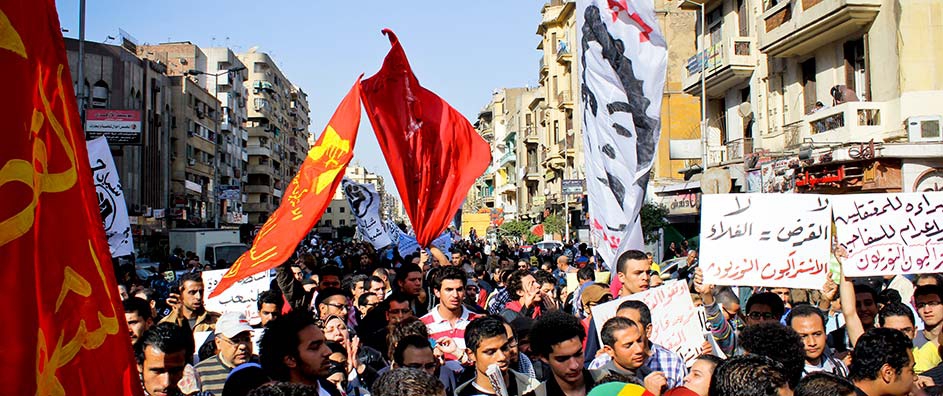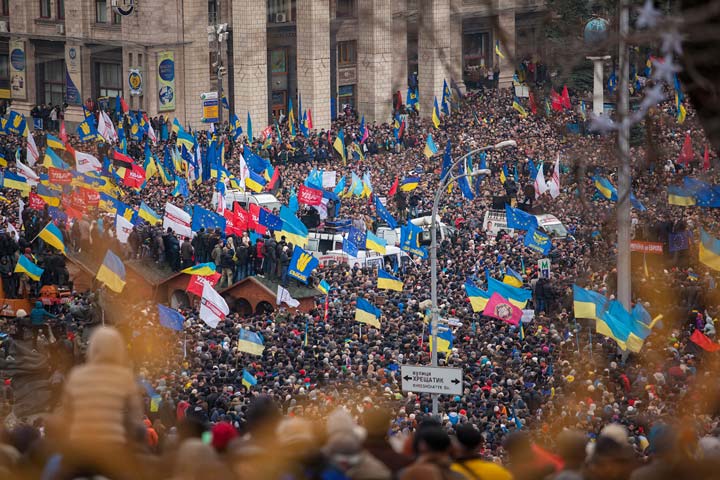The views expressed in our content reflect individual perspectives and do not represent the authoritative views of the Baha'i Faith.
When others around me have lauded the various protest movements that have happened over the last decade (in Ukraine, Egypt, Tunisia, Burma, etc…), I have generally sounded a note of caution against being overly optimistic.
That has not always made me the most popular person in the room as everyone else pours the champagne. One can certainly make a good case for the benefits of putting despots out of power, but, in my view, the longer term peace and progress of society requires vision, moral leadership, and, most of all, unity. If protest movements lead to more fracturing and less social cohesion then, should we rethink them?
Several decades ago, the international governing body of the Baha’i Faith—the Universal House of Justice—made a statement that still seems relevant to today’s chaotic times:
Governments and peoples of both the developed and developing nations, and other human institutions, secular and religious, finding themselves helpless to reverse the trend of the catastrophic events of the day, stand bewildered and overpowered by the magnitude and complexity of the problems facing them. At this fateful hour in human history many, unfortunately, seem content to stand aside and wring their hands in despair or else join in the babel of shouting and protestation which loudly objects, but offers no solution to the woes and afflictions plaguing our age. – the Universal House of Justice, Messages 1963 to 1986, p. 153.
Those making loud protestations, in other words, don’t necessarily always offer an inclusive vision for a just society; which, the Baha’is would point out, requires an ethical framework. Furthermore, the revolutions inspired by protest movements can be more damaging than helpful when the discourse spirals down into “us vs. them” dividing lines. Conflict entrepreneurs, as they are sometimes called, will often create these fissures for their own self-serving ends. True moral leaders, in contrast, aim to serve others and to build bridges.
As the Baha’i-inspired Spiritual Capital and Moral Leadership Institute notes:
Moral leaders know how to manage themselves, how to temper their egos and how to act with nobility and rectitude. They are visionary and affect personal change. Moral leaders also have a highly developed sense of emotional intelligence and master key social skills. They work to overcome obstacles and are skilled at the art of consultation. They build consensus, navigate diversity, and establish unity.
If we fail to address the deep divisions in society, long-term improvements become unlikely. Or, the situation may become worse. Take the Orange Revolution of late 2004 in the Ukraine. As a Time Magazine article pointed out several years later, the revolution did not address the country’s deep divisions between the Russian-speaking, industrial east and a Ukrainian-speaking, nationalistic, pro-
European, and agricultural west. In 2014, those divisions have now erupted into a new crisis. And, we can see the same thing happening in Iraq with sectarian divisions once again tearing that country apart, with dire consequences for many innocent people. Disunity is the underlying disease. Until protesters and policymakers alike start addressing that issue, they merely swat at symptoms.
As Shoghi Effendi, the Guardian of the Baha’i Faith said:
… most people look upon unity as an ultimate, almost unattainable goal and concentrate first on remedying all the other ills of mankind. If they did but know it, these other ills are but various symptoms and side effects of the basic disease—disunity. – The World Order of Baha’u’llah, p. 203.
For those who see the Baha’i focus on unity as overly idealistic, I would ask: is the increasing tribalism we see in the world today really a sustainable model?
“That which is conducive to association and attraction and unity among the sons of men is the means of the life of the world of humanity,” writes Abdu’l-Baha, one of the central figures of the Baha’i Faith, who goes on to add that “whatever causeth division, repulsion and remoteness leadeth to the death of humankind.” – Selections from the Writings of Abdu’l-Baha, p. 290.
The words of the Bible are also relevant here: “Every kingdom divided against itself is laid waste, and no city or house divided against itself will stand.” – Mathew 12:25.
Yes, overcoming the deep divisions, disunity, and seemingly increasing polarization in contemporary society is a tall order, but there are practical places to start. One entry point: changing our mental constructs to realize that disunity is the root cause of conflict, rather than just a symptom. Another solution: educational programs that teach moral leadership and help to broaden people’s identities, focusing on what unites people rather than on what divides them. And what if, at a policy level, we allocated more resources to empowering society’s connectors, rather than continuing to support its dividers?
At the end of the day, I’m not a complete “party pooper.” Protest movements can play an important role in bringing attention to inequities, but longer-term change for a just—and united—society requires digging a bit deeper and, perhaps, all of us coming up with more novel and long-lasting solutions.
You May Also Like
Comments


















My point is that true Unity is impossible without actual justice. Socially cohesive periods have come and gone in history without having a positive effect on mankind, per se. I am thinking of the Middle Ages in Europe, for instance, when near religious unanimity existed and entire populations believed in the divine right of kings and accepted the prevailing injustices with only a very occasional murmur of dissent. Of course, similar states of historical slumber occurred in other epochs: the Roman Empire, the Ottoman Empire(!), and the long, dark night of Chinese history, for instance.
So, to conclude: While I understand that contemplating current events from the Bahá'í perspective can be confusing and troubling (since so little of it seems to point to a quick resolution into global harmony), I think that efforts to bring about unity without at the same time addressing injustice is impossible. And more than that: because injustices are not addressed, such efforts have the effect of perpetrating injustices and denying support to those who’ve made it their mission to addressed and resolve them.